Midweek Review
‘Perils of a Profession’ jolts scandal-ridden police
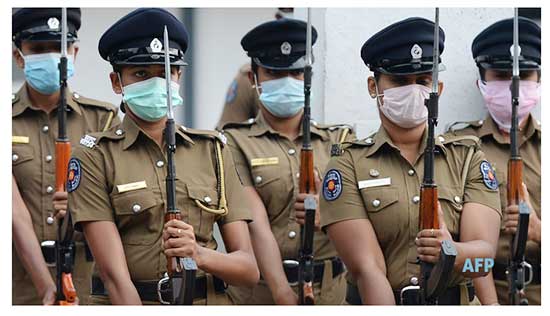
By Shamindra Ferdinando
Retired Senior Deputy Inspector General (SDIG) Merril Gunaratne quoted the then Air Force Commander Air Marshal Walter Fernando as having said at a National Security Council (NSC) meeting, chaired by the then President JRJ, in the mid-80s: “It is not a laughing matter for me.” Fernando was responding to the late Lalith Athulathmudali, the then National Security Minister whose comment on an incident in Vavuniya that claimed the lives of several airmen dismayed the Air Marshal. Gunaratne had been there as the top intelligence representative.
Fernando served as the Commander of the Air Force from May 1, 1986, to July 1, 1990. Fernando retired a few weeks after the eruption of Eelam War II. It would be pertinent to mention his only son Squadron Leader A.P.W. Fernando, was among those killed when the LTTE brought down the Chinese-built Y8 flying over the Elephant Pass area, on July 5, 1992.
The revealing anecdote was one among many such disclosures in Gunaratne’s latest book ‘Perils of a Profession’ launched this month. Gunaratne asserted that the Air Force Commander resented the Minister’s comment that apparently belittled the service.
The author of two previous books ‘Dilemma of an Island ‘ and ‘Cop in the Cross Fire,’ released in 2001 and 2011, respectively, the outspoken retired top cop couldn’t have launched his third at a better time than when the Presidential Commission of Inquiry (PcoI), into the 2019 Easter Sunday carnage, is on the verge of concluding its high profile inquiry. Gunaratne certainly didn’t mince his words when he appeared before the PCoI last year.
The question is whether perhaps the worst ever intelligence failure facilitated the coordinated suicide attacks on six targets on the morning of April 21, 2019? Or could it have been thwarted if the Attorney General’s Department acted swiftly, and decisively, when the Terrorist Investigation Division (TID) brought the growing threat, posed by the National Thowheed Jamaat (NTJ) leader Zahran Hashim, to its notice, in July 2017?
Kudos from retired Maj. Gen.
In his latest work, Gunaratne, whose illustrious career spanning 35 years included a significant period with the premier intelligence service, dealt with precision the deterioration of the once proud police service. In spite of ‘Perils of a Profession’ being rather short, the revelations, therein, are certainly explosive. There hadn’t been such disclosure in the past, by any other retired law enforcement officer.
Gunaratne’s writing skills received the acclaim of retired Maj. Gen. Lalin Fernando, an admirable writer himself. In a brief commendation of Gunaratne’s third book, Fernando asserted: “No gazetted police officer has shown his ability to write as lucidly on real concerns of the police, from professional competence to welfare of the beat constable.”
Having joined the police, in July 1965, Gunaratne served the department during a turbulent time, before leaving the service, as a Senior DIG. Sri Lanka brought the war to a successful conclusion nine years after the author’s retirement, in 2000.
‘Perils of a Profession’ dealt aggressively with the deterioration of the service, over the years, resulting in an unprecedented crisis. The writer, without hesitation, blamed the politicians and the police for the degeneration of the department to such a pathetic state that today the once proud Police Narcotics Bureau (PNB) is under investigation for dealing in heroin.
Retired Rear Admiral Sarath Weerasekera, now in charge of the police, in his capacity as the Public Security Minister, should peruse ‘Perils of a Profession’ without further delay. There hadn’t been a previous instance of the police coming under a retired military officer, though the last government made a desperate bid to secure the then President Maithripala Sirisena’s consent to Field Marshal Sarath Fonseka as Law and Order Minister. The senior partner of the yahapalana administration wanted Fonseka to replace Sagala Ratnayake, one of the beleaguered UNP leader Ranil Wickremesinghe’s close associates. President Gotabaya Rajapaksa not only brought the police under a retired Rear Admiral, he named retired Gen. Jagath Alwis, his first choice as the Chief of National Intelligence (CNI), as the new Secretary, Ministry of Public Order.
Against that background, another disclosure made by Gunaratne, regarding certain law enforcement officers thwarting Minister Ratnayake’s efforts at reforming the police, should be examined. That particular anecdote revealed how serving officers resented Ratnayake’s bid to secure the retired intelligence officer’s expertise. Perhaps Ratnayake hadn’t been aware of Wickremesinghe’s resentment towards Gunaratne whose controversial assessments on matters of national importance exasperated him.
‘Cop in the Cross Fire’ revealed how Wickremesinghe’s own views on national security matters clashed with those of Gunaratne during the latter’s tenure as an ‘advisor’ – 2002-2004. Gunaratne’s bold assessment, in his capacity as an ‘advisor’ on the rapid increase in the fighting cadre of the Liberation Tigers of Tamil Eelam (LTTE), after the signing of the highly controversial Ceasefire Agreement (CFA), finalized in Feb 2002, without the knowledge of President Kumaratunga, and much of his own government, quite angered the then Premier Wickremesinghe.
Athulathmudali’s intervention
Gunaratne questioned security/intelligence strategies that had been in place, or were in the process of development when the NTJ struck in April 2019, in spite of receiving specific information from neighbouring India. The writer dealt expertly with the weakening of the police, including the premier intelligence apparatus over the years under whatever name it was called. In Chapter 7, titled ‘Moving into intelligence from normal police work,’ Gunaratne disclosed how Athulathmudali re-named what was then called Intelligence Services Division (ISD). Whatever, the country’s premier intelligence network was called, a senior policeman had been always at its helm.
In Gunaratne’s assessment, the Special Branch (SB) of the CID and the Military Intelligence (MI) played a relatively lower role when compared with that of the premier apparatus, called the State Intelligence Service (SIS), at the time the NTJ struck. That resulted in the SIS being placed under Maj. Gen. Suresh Sally, formerly of the MI. Interestingly, the then Premier Wickermesinghe found fault with the then Brigadier Sally for the writer’s reportage of the recovery of explosives in the north and the arrest of some suspects in the early 2016. The premier intelligence service had always been under a senior police officer. At the time the NTJ struck, SDIG Nilantha Jayawardena had been at the helm of the SIS. The proceedings undertaken by the Parliamentary Select Committee (PSC) and the on-going PCoI revealed the existence of a special relationship between the then President Maithripala Sirisena and the SIS Chief.
Did the close association between the Commander-in-Chief and his spy chief, too, contribute to the overall deterioration of the security setup? The PSC, in its report tabled in Parliament on Oct 23 found fault with Jayawardena for the pathetic handling of the available Indian intelligence until the NTJ terrorists went on the rampage.
Gunaratne blamed an appointment of a novice as the head of the premier intelligence service, after the 1994 presidential election, for the rapid deterioration of the apparatus. Although, the author refrained from naming the officer, the recipient of the coveted post of Director, SIS, was the late retired Senior Superintendent of Police T.V. Sumanasekera.
Nilantha Jayawardena, who is now literally on the mat for the Easter Sunday intelligence failure, too, had served the SIS even then. Gunaratne’s reference to SIS having wiretapping apparatus is certainly not necessary as the premier intelligence outfit couldn’t perform its legitimate duties without that particular capacity.
The deterioration of politics can be certainly compared with the current political setup. Having read, utterly contemptuous account of the top political leadership and members of the Parliament, the police and the Parliament seemed to be in the same predicament.
UNP faulted
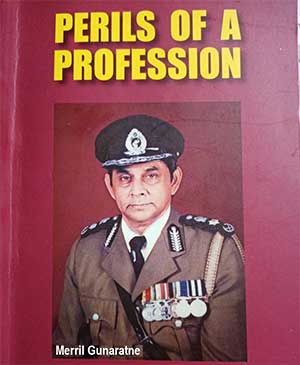 According to Gunaratne, the rot had set in the wake of the UNP landslide, in 1977. The author compared his experience as SSP, Kelaniya and SSP Kurunegala during the period 1977-1978 and how some of those who were represented in parliament violated the laws of the land, misused police and political interference made at the highest levels. Among those miscreants who had been named by the retired cop was the late Minister Cyril Mathew. Gunaratne explained how the UNP cleverly used and abused the police in its diabolical project. An influential section of the police, for obvious reasons, cooperated with the then political leadership much to the dismay of those who struggled to thwart constant and belligerent political interference. Gunaratne earned the wrath of some UNP lawmakers for refusing to cooperate with the ruling party’s strategy. Some took up Gunaratne’s conduct with no less a person than JRJ and in some instances with Premier Ranasinghe Premadasa.
According to Gunaratne, the rot had set in the wake of the UNP landslide, in 1977. The author compared his experience as SSP, Kelaniya and SSP Kurunegala during the period 1977-1978 and how some of those who were represented in parliament violated the laws of the land, misused police and political interference made at the highest levels. Among those miscreants who had been named by the retired cop was the late Minister Cyril Mathew. Gunaratne explained how the UNP cleverly used and abused the police in its diabolical project. An influential section of the police, for obvious reasons, cooperated with the then political leadership much to the dismay of those who struggled to thwart constant and belligerent political interference. Gunaratne earned the wrath of some UNP lawmakers for refusing to cooperate with the ruling party’s strategy. Some took up Gunaratne’s conduct with no less a person than JRJ and in some instances with Premier Ranasinghe Premadasa.
With the UNP enjoying an unprecedented 5/6 parliamentary power, the dictatorial UNP administration expected the police to fall in line. They largely did. The situation deteriorated further in the wake of the 1982, more or less, rigged referendum, that allowed the UNP to retain a monstrous overwhelming 2/3 majority, till 1988.
The late Dingiri Banda Wijetunga’s short tenure as the President during the period 1993-1994 in the wake of Ranasinghe Premadasa’s May Day 1993 assassination, never really received much public attention. Wijetunga oversaw the party in the run-up to parliamentary and presidential polls in August and November, 1994, respectively. Wijetunga thwarted Wickremesinghe by facilitating the return of rebel Gamini Dissanayake back to the party. The author refrained from discussing Wijetunga’s political moves though he dealt harshly with the President’s destructive policy as regards the police. Gunaratne explained how the successful Commandant of the elite Special Task Force (STF), the late Lionel Karunasena, failed to prevent Wijetunga’s interference. The author examined Karunasena’s failure against the backdrop of his success in convincing JRJ and Premadasa not to interfere with the elite unit.
Gunaratne’s allegation, with regard to the shortsighted increase of the DIG cadre, from 11 to 30, overnight, and the number of Senior DIGs, from three to five, contributed to the overall deterioration of law enforcement, should be thoroughly examined. The accusation that Wijetunga lacked even the basic understanding of law enforcement thereby caused chaos in the overall administrative setup, by constant interference, should prompt a reappraisal of the whole department. Successive governments played politics with the police to varying degrees. After the change of governments, those who even vacated posts, or were moved out on disciplinary grounds, manipulated the utterly corrupt system to return to the service and secure backdated promotions. Backdoor promotions were routine and so widespread, higher ranks could be secured outside, what Gunaratne called, eligibility criteria.
A righteous IGP
‘Perils of a Profession’ explained how successive governments, since the 1977 general election, contributed to the ruination of the police department. Backdoor promotions had been a major cause of concern. Having dealt how he personally took up an alleged move to overtake him in the seniority line to pave the way for another, with President Premadasa, at an STF circuit bungalow, Gunaratne paid a glowing tribute to Cyril Herath, as the only IGP who had the strength to quit the service than play politics.
Gunaratne claimed he was present when Herath turned down an offer of an ambassadorial post from the then Defence Secretary Gen. Sepala Attygalle in the wake of the former’s decision to resign.
Gunaratne has quoted Herath as having told Attygalle: “Sir, I have not come to you with my resignation letter to canvas for an ambassadorial post.”
During PSC and PCoI proceedings, the alleged offer made by President Sirisena to the disgraced IGP Pujith Jayasundera to accept the responsibility for the Easter Sunday carnage in return for a diplomatic posting, transpired. Obviously, Jayasundera declined the treacherous offer. The previous Rajapaksa administration named Mahinda Balasuriya, Sri Lanka’s Ambassador to Brazil, after he accepted responsibility for the police firing at a group of protesting Katunayake Free Trade Zone (FRZ) workers.
There certainly cannot be any other instance of a senior retired police officer coming out so strongly against the system at his own expense. Have you ever heard of any retired public servant objecting to a scheme that certainly benefited him at the taxpayers’ expense? Gunaratne discussed the controversial move to assign police personnel to retired IGPs and SDIGs for what the Association of Police Chiefs (APC) described as an effort to ‘maintain their reputation and dignity.’ The APC proposal that had been approved by the National Police Commission (NPC) on April 23, 2020, was the brainchild of retired SDIG Gamini Navaratne. The whole exercise was meant to provide a controversial facility on the basis that senior retired military officers enjoyed such a privilege.
Gunaratne’s thought-provoking opinions on law enforcement operations should be seriously examined. If the Public Security Ministry is genuinely interested in reforms, perhaps the Minister and Secretary can seek a Presidential Commission to make recommendations. Actually, Gunaratne has made some excellent proposals, first to arrest the decline and then improve the service. The police service has deteriorated to such an extent, it would be a herculean task to restore the standards to the pre-1977 period.
In fact, the blatant role the Office of the President had played, since the introduction of the JRJ Constitution in the ruination of the once public friendly service, shouldn’t be swept under the carpet. The deterioration of the police should be examined, taking into consideration extremely serious lapses on the part of the Attorney General’s Department in the run up to the 2019 Easter Sunday attacks. Although, Gunaratne never referred to the AG’s Department lapses that may have given the NTJ the time and the space to mount near simultaneous suicide attacks on six unprotected targets.
A shocking injustice
‘Perils of a Profession’ is the story of incredulity. Having suffered in the hands of the UNP as a result of him being dubbed an SLFPer, Gunaratne, in the wake of Chandrika Bandaranaike Kumaratunga’s victory in 1994, was targeted over his alleged role in the Batalanda torture chamber. In spite of Gunaratne being cleared by way of an investigation carried out by the police at the behest of the Presidential Commission that probed Batalanda, the top cop was placed on compulsory leave. Gunaratne speculated whether the then government sent him on compulsory leave to pave the way for Lucky Kodituwakku to succeed retiring IGP Rajaguru. Gunaratne questioned how Kodituwakku, having resigned, following a rather short career, returned in the wake of the People’s Alliance (PA) victory to take the top post.
Gunaratne had no qualms in discussing perks and privileges enjoyed by the senior officers. The top layer seems to be having a good time. With a section of the department given special status, the others appear to be going ahead with their own projects. Last year’s exposure of the Police Narcotics Bureau (PNB) dealing in heroin is a grim reminder of the appalling state of affairs. The releasing of Easter Sunday terror suspect, Riyaj Bathiudeen, held by the CID in late Oct 2020, raised many an eyebrow. Let us hope the ‘Perils of a Profession’ really jolts the Public Security Ministry.
However, some may not buy Gunaratne’s narration. Critics may find fault with Gunaratne simply because some of the people he is now freely writing about are no longer alive. The author cannot deny the fact that he enjoyed the ride as the head of intelligence, under the UNP, for quite a long period, at a time the NIB was dubbed No Information Bureau.
The police top brass cannot absolve themselves of their failure to prevent the ‘83 riots. Sri Lanka paid a very heavy price for that dastardly violence. Were the police taking orders from outside interests to cause a calamity here? The same thing happened in the run up to the Easter Sunday carnage and thereafter when Sinhala mobs went after ordinary Muslims. Both the police and the Army simply did not act even when mobs came in their hundreds on motorcycles from outside to places like Minuwangoda. Did the cops fire a single shot towards those rampaging mobs? Even our then big talking Army Commander Mahesh Senanayake did nothing.
Police had been always bumming those in power and this was a practice coming down from the colonial period. They were no angels prior to ‘77.
Whatever the shortcomings of President Wijetunga, he should receive the kudos for refusing to fix the election against Chandrika Bandaranaike Kumaratunga, in 1994. Normally the UNP was famous for stealing elections up to then.
- News Advertiesment
See Kapruka’s top selling online shopping categories such as Toys, Grocery, Flowers, Birthday Cakes, Fruits, Chocolates, Clothing and Electronics. Also see Kapruka’s unique online services such as Money Remittence,News, Courier/Delivery, Food Delivery and over 700 top brands. Also get products from Amazon & Ebay via Kapruka Gloabal Shop into Sri Lanka.
Midweek Review
‘Professor of English Language Teaching’
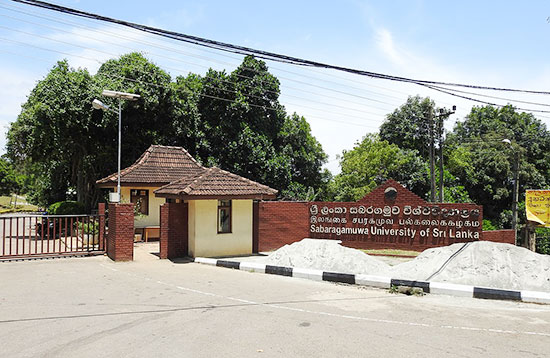
It is a pleasure to be here today, when the University resumes postgraduate work in English and Education which we first embarked on over 20 years ago. The presence of a Professor on English Language Teaching from Kelaniya makes clear that the concept has now been mainstreamed, which is a cause for great satisfaction.
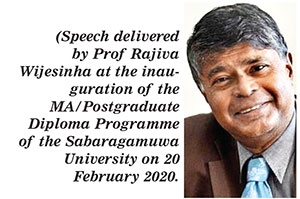 Twenty years ago, this was not the case. Our initiative was looked at askance, as indeed was the initiative which Prof. Arjuna Aluwihare engaged in as UGC Chairman to make degrees in English more widely available. Those were the days in which the three established Departments of English in the University system, at Peradeniya and Kelaniya and Colombo, were unbelievably conservative. Their contempt for his efforts made him turn to Sri Jayewardenepura, which did not even have a Department of English then and only offered it as one amongst three subjects for a General Degree.
Twenty years ago, this was not the case. Our initiative was looked at askance, as indeed was the initiative which Prof. Arjuna Aluwihare engaged in as UGC Chairman to make degrees in English more widely available. Those were the days in which the three established Departments of English in the University system, at Peradeniya and Kelaniya and Colombo, were unbelievably conservative. Their contempt for his efforts made him turn to Sri Jayewardenepura, which did not even have a Department of English then and only offered it as one amongst three subjects for a General Degree.
Ironically, the most dogmatic defence of this exclusivity came from Colombo, where the pioneer in English teaching had been Prof. Chitra Wickramasuriya, whose expertise was, in fact, in English teaching. But her successor, when I tried to suggest reforms, told me proudly that their graduates could go on to do postgraduate degrees at Cambridge. I suppose that, for generations brought up on idolization of E. F. C. Ludowyke, that was the acme of intellectual achievement.
I should note that the sort of idealization of Ludowyke, the then academic establishment engaged in was unfair to a very broadminded man. It was the Kelaniya establishment that claimed that he ‘maintained high standards, but was rarefied and Eurocentric and had an inhibiting effect on creative writing’. This was quite preposterous coming from someone who removed all Sri Lankan and other post-colonial writing from an Advanced Level English syllabus. That syllabus, I should mention, began with Jacobean poetry about the cherry-cheeked charms of Englishwomen. And such a characterization of Ludowyke totally ignored his roots in Sri Lanka, his work in drama which helped Sarachchandra so much, and his writing including ‘Those Long Afternoons’, which I am delighted that a former Sabaragamuwa student, C K Jayanetti, hopes to resurrect.
I have gone at some length into the situation in the nineties because I notice that your syllabus includes in the very first semester study of ‘Paradigms in Sri Lankan English Education’. This is an excellent idea, something which we did not have in our long-ago syllabus. But that was perhaps understandable since there was little to study then except a history of increasing exclusivity, and a betrayal of the excuse for getting the additional funding those English Departments received. They claimed to be developing teachers of English for the nation; complete nonsense, since those who were knowledgeable about cherries ripening in a face were not likely to move to rural areas in Sri Lanka to teach English. It was left to the products of Aluwihare’s initiative to undertake that task.
Another absurdity of that period, which seems so far away now, was resistance to training for teaching within the university system. When I restarted English medium education in the state system in Sri Lanka, in 2001, and realized what an uphill struggle it was to find competent teachers, I wrote to all the universities asking that they introduce modules in teacher training. I met condign refusal from all except, I should note with continuing gratitude, from the University of Sri Jayewardenepura, where Paru Nagasunderam introduced it for the external degree. When I started that degree, I had taken a leaf out of Kelaniya’s book and, in addition to English Literature and English Language, taught as two separate subjects given the language development needs of students, made the third subject Classics. But in time I realized that was not at all useful. Thankfully, that left a hole which ELT filled admirably at the turn of the century.
The title of your keynote speaker today, Professor of English Language Teaching, is clear evidence of how far we have come from those distant days, and how thankful we should be that a new generation of practical academics such as her and Dinali Fernando at Kelaniya, Chitra Jayatilleke and Madhubhashini Ratnayake at USJP and the lively lot at the Postgraduate Institute of English at the Open University are now making the running. I hope Sabaragamuwa under its current team will once again take its former place at the forefront of innovation.
To get back to your curriculum, I have been asked to teach for the paper on Advanced Reading and Writing in English. I worried about this at first since it is a very long time since I have taught, and I feel the old energy and enthusiasm are rapidly fading. But having seen the care with which the syllabus has been designed, I thought I should try to revive my flagging capabilities.
However, I have suggested that the university prescribe a textbook for this course since I think it is essential, if the rounded reading prescribed is to be done, that students should have ready access to a range of material. One of the reasons I began while at the British Council an intensive programme of publications was that students did not read round their texts. If a novel was prescribed, they read that novel and nothing more. If particular poems were prescribed, they read those poems and nothing more. This was especially damaging in the latter case since the more one read of any poet the more one understood what he was expressing.
Though given the short notice I could not prepare anything, I remembered a series of school textbooks I had been asked to prepare about 15 years ago by International Book House for what were termed international schools offering the local syllabus in the English medium. Obviously, the appalling textbooks produced by the Ministry of Education in those days for the rather primitive English syllabus were unsuitable for students with more advanced English. So, I put together more sophisticated readers which proved popular. I was heartened too by a very positive review of these by Dinali Fernando, now at Kelaniya, whose approach to students has always been both sympathetic and practical.
I hope then that, in addition to the texts from the book that I will discuss, students will read other texts in the book. In addition to poetry and fiction the book has texts on politics and history and law and international relations, about which one would hope postgraduate students would want some basic understanding.
Similarly, I do hope whoever teaches about Paradigms in English Education will prescribe a textbook so that students will understand more about what has been going on. Unfortunately, there has been little published about this but at least some students will I think benefit from my book on English and Education: In Search of Equity and Excellence? which Godage & Bros brought out in 2016. And then there was Lakmahal Justified: Taking English to the People, which came out in 2018, though that covers other topics too and only particular chapters will be relevant.
The former book is bulky but I believe it is entertaining as well. So, to conclude I will quote from it, to show what should not be done in Education and English. For instance, it is heartening that you are concerned with ‘social integration, co-existence and intercultural harmony’ and that you want to encourage ‘sensitivity towards different cultural and linguistic identities’. But for heaven’s sake do not do it as the NIE did several years ago in exaggerating differences. In those dark days, they produced textbooks which declared that ‘Muslims are better known as heavy eaters and have introduced many tasty dishes to the country. Watalappam and Buriani are some of these dishes. A distinguished feature of the Muslims is that they sit on the floor and eat food from a single plate to show their brotherhood. They eat string hoppers and hoppers for breakfast. They have rice and curry for lunch and dinner.’ The Sinhalese have ‘three hearty meals a day’ and ‘The ladies wear the saree with a difference and it is called the Kandyan saree’. Conversely, the Tamils ‘who live mainly in the northern and eastern provinces … speak the Tamil language with a heavy accent’ and ‘are a close-knit group with a heavy cultural background’’.
And for heaven’s sake do not train teachers by telling them that ‘Still the traditional ‘Transmission’ and the ‘Transaction’ roles are prevalent in the classroom. Due to the adverse standard of the school leavers, it has become necessary to develop the learning-teaching process. In the ‘Transmission’ role, the student is considered as someone who does not know anything and the teacher transmits knowledge to him or her. This inhibits the development of the student.
In the ‘Transaction’ role, the dialogue that the teacher starts with the students is the initial stage of this (whatever this might be). Thereafter, from the teacher to the class and from the class to the teacher, ideas flow and interaction between student-student too starts afterwards and turns into a dialogue. From known to unknown, simple to complex are initiated and for this to happen, the teacher starts questioning.’
And while avoiding such tedious jargon, please make sure their command of the language is better than to produce sentences such as these, or what was seen in an English text, again thankfully several years ago:
Read the story …
Hello! We are going to the zoo. “Do you like to join us” asked Sylvia. “Sorry, I can’t I’m going to the library now. Anyway, have a nice time” bye.
So Syliva went to the zoo with her parents. At the entrance her father bought tickets. First, they went to see the monkeys
She looked at a monkey. It made a funny face and started swinging Sylvia shouted: “He is swinging look now it is hanging from its tail its marvellous”
“Monkey usually do that’
I do hope your students will not hang from their tails as these monkeys do.
Midweek Review
Little known composers of classical super-hits

By Satyajith Andradi
Quite understandably, the world of classical music is dominated by the brand images of great composers. It is their compositions that we very often hear. Further, it is their life histories that we get to know. In fact, loads of information associated with great names starting with Beethoven, Bach and Mozart has become second nature to classical music aficionados. The classical music industry, comprising impresarios, music publishers, record companies, broadcasters, critics, and scholars, not to mention composers and performers, is largely responsible for this. However, it so happens that classical music lovers are from time to time pleasantly struck by the irresistible charm and beauty of classical pieces, the origins of which are little known, if not through and through obscure. Intriguingly, most of these musical gems happen to be classical super – hits. This article attempts to present some of these famous pieces and their little-known composers.
Pachelbel’s Canon in D
The highly popular piece known as Pachelbel’s Canon in D constitutes the first part of Johann Pachelbel’s ‘Canon and Gigue in D major for three violins and basso continuo’. The second part of the work, namely the gigue, is rarely performed. Pachelbel was a German organist and composer. He was born in Nuremburg in 1653, and was held in high esteem during his life time. He held many important musical posts including that of organist of the famed St Stephen’s Cathedral in Vienna. He was the teacher of Bach’s elder brother Johann Christoph. Bach held Pachelbel in high regard, and used his compositions as models during his formative years as a composer. Pachelbel died in Nuremburg in 1706.
Pachelbel’s Canon in D is an intricate piece of contrapuntal music. The melodic phrases played by one voice are strictly imitated by the other voices. Whilst the basso continuo constitutes a basso ostinato, the other three voices subject the original tune to tasteful variation. Although the canon was written for three violins and continuo, its immense popularity has resulted in the adoption of the piece to numerous other combinations of instruments. The music is intensely soothing and uplifting. Understandingly, it is widely played at joyous functions such as weddings.
Jeremiah Clarke’s Trumpet Voluntary
The hugely popular piece known as ‘Jeremiah Clarke’s Trumpet Voluntary’ appeared originally as ‘ The Prince of Denmark’s March’ in Jeremiah Clarke’s book ‘ Choice lessons for the Harpsichord and Spinet’, which was published in 1700 ( Michael Kennedy; Oxford Dictionary of Music ). Sometimes, it has also been erroneously attributed to England’s greatest composer Henry Purcell (1659 – 1695 ) and called ‘Purcell’s Trumpet Voluntary (Percy A. Scholes ; Oxford Companion to Music). This brilliant composition is often played at joyous occasions such as weddings and graduation ceremonies. Needless to say, it is a piece of processional music, par excellence. As its name suggests, it is probably best suited for solo trumpet and organ. However, it is often played for different combinations of instruments, with or without solo trumpet. It was composed by the English composer and organist Jeremiah Clarke.
Jeremiah Clarke was born in London in 1670. He was, like his elder contemporary Pachelbel, a musician of great repute during his time, and held important musical posts. He was the organist of London’s St. Paul’s Cathedral and the composer of the Theatre Royal. He died in London in 1707 due to self – inflicted gun – shot injuries, supposedly resulting from a failed love affair.
Albinoni’s Adagio
The full title of the hugely famous piece known as ‘Albinoni’s Adagio’ is ‘Adagio for organ and strings in G minor’. However, due to its enormous popularity, the piece has been arranged for numerous combinations of instruments. It is also rendered as an organ solo. The composition, which epitomizes pathos, is structured as a chaconne with a brooding bass, which reminds of the inevitability and ever presence of death. Nonetheless, there is no trace of despondency in this ethereal music. On the contrary, its intense euphony transcends the feeling of death and calms the soul. The composition has been attributed to the Italian composer Tomaso Albinoni (1671 – 1750), who was a contemporary of Bach and Handel. However, the authorship of the work is shrouded in mystery. Michael Kennedy notes: “The popular Adagio for organ and strings in G minor owes very little to Albinoni, having been constructed from a MS fragment by the twentieth century Italian musicologist Remo Giazotto, whose copyright it is” (Michael Kennedy; Oxford Dictionary of Music).
Boccherini’s Minuet
The classical super-hit known as ‘Boccherini’s Minuet’ is quite different from ‘Albinoni’s Adagio’. It is a short piece of absolutely delightful music. It was composed by the Italian cellist and composer Luigi Boccherini. It belongs to his string quintet in E major, Op. 13, No. 5. However, due to its immense popularity, the minuet is performed on different combinations of instruments.
Boccherini was born in Lucca in 1743. He was a contemporary of Haydn and Mozart, and an elder contemporary of Beethoven. He was a prolific composer. His music shows considerable affinity to that of Haydn. He lived in Madrid for a considerable part of his life, and was attached to the royal court of Spain as a chamber composer. Boccherini died in poverty in Madrid in 1805.
Like numerous other souls, I have found immense joy by listening to popular classical pieces like Pachelbel’s Canon in D, Jeremiah Clarke’s Trumpet Voluntary, Albinoni’s Adagio and Boccherini’s Minuet. They have often helped me to unwind and get over the stresses of daily life. Intriguingly, such music has also made me wonder how our world would have been if the likes of Bach, Handel, Haydn, Mozart, Beethoven, and Schubert had never lived. Surely, the world would have been immeasurably poorer without them. However, in all probability, we would have still had Pachelbel’s Canon in D, Jeremiah Clarke’s Trumpet Voluntary, Albinoni’s Adagio, and Boccherini’s Minuet, to cheer us up and uplift our spirits.
Midweek Review
The Tax Payer and the Tough
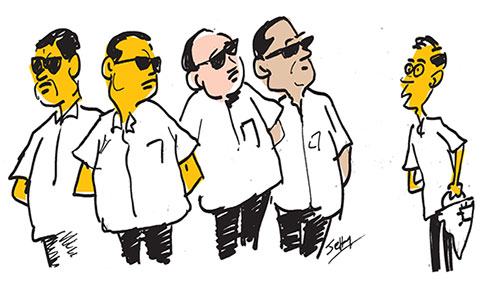
By Lynn Ockersz
The tax owed by him to Caesar,
Leaves our retiree aghast…
How is he to foot this bill,
With the few rupees,
He has scraped together over the months,
In a shrinking savings account,
While the fires in his crumbling hearth,
Come to a sputtering halt?
But in the suave villa next door,
Stands a hulk in shiny black and white,
Over a Member of the August House,
Keeping an eagle eye,
Lest the Rep of great renown,
Be besieged by petitioners,
Crying out for respite,
From worries in a hand-to-mouth life,
But this thought our retiree horrifies:
Aren’t his hard-earned rupees,
Merely fattening Caesar and his cohorts?









